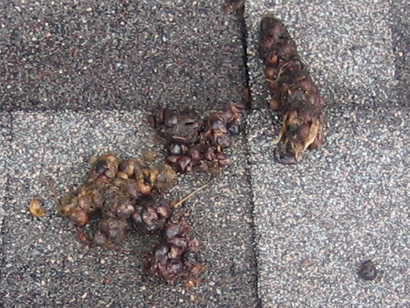Personal protective equipment ppe must be worn while cleaning up after a raccoon.
Raccoon droppings in attic.
Use a shovel or scoop to carefully collect the droppings and any surrounding insulation or materials.
Fresh feces are tubular in shape 7 15 cm long with blunt ends and with a similar diameter as a nickel.
The droppings and urine can act as a vector for disease such as leptospirosis salmonella infection raccoon roundworm hookworm cryptosporidiosis and more.
Raccoons often leave their feces in communal sites called latrines.
Latrines may be found at or on.
When animals live in your attic they always defecate and urinate and they may leave a big mess behind.
Same goes for urine as well.
If you don t clean feces in the attic it s likely to attract insects perhaps future animals and the roundworm spores live a long time.
Raccoons leave their waste behind when they inhabit an attic.
If you think there s a risk of a person or pet coming into contact with the feces clean it.
Five out of 25 reported cases end in death so extreme caution must be taken when cleaning up after raccoon infestations.
Even if a raccoon poops in the swimming pool the chlorine won t kill roundworm eggs.
Because raccoons are the primary host of baylisascaris procyanis a roundworm that can harm people and the roundworm eggs may be present in raccoon feces their latrines should be removed and cleaned up whenever they might pose a health hazard this the task requires extreme caution.
Place them inside a heavy duty garbage bag and completely seal the top.
If you have a raccoon infestation in your attic or anywhere else on your property you will be able to clearly see their toilet too.
While most raccoon feces are dark in color this can change depending on the animal s diet.
Sometimes there s a specific raccoon latrine and most of the poop is piled up in one spot.
There s absolutely no doubt about it raccoon feces are very dangerous to touch or breathe.
Avoid tearing the bag and double bag if needed.
To remove the feces from your attic.
Carefully remove the bag from the attic and avoid cross contaminating your home.
Raccoons carry diseases that can be contracted by our pets and even by us.
Sometimes it s spread out all over the attic.
How to get rid of raccoon droppings in the attic the best approach is a full cleanup with either vacuuming of feces or insulation removal and fogging of the attic with a special enzyme cleaner.
Restoration personnel may be called on this kind of job to treat the odor of the feces or clean up a raccoon inhabited basement or attic.
The appearance of raccoon droppings differs depending on how old it is and what the raccoon had eaten.
Raccoon feces usually are dark and tubular and have a pungent odor.

